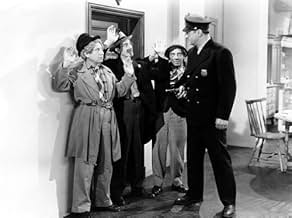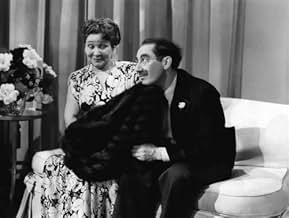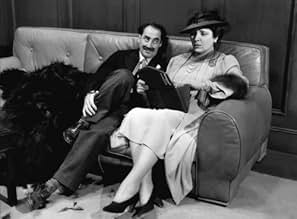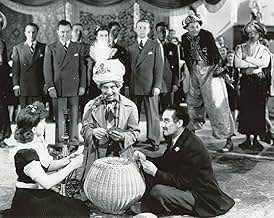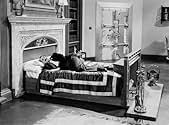IMDb RATING
6.5/10
5.6K
YOUR RATING
A detective is hired to protect the life of a singer who has recently inherited a department store, from the store's crooked manager.A detective is hired to protect the life of a singer who has recently inherited a department store, from the store's crooked manager.A detective is hired to protect the life of a singer who has recently inherited a department store, from the store's crooked manager.
King Baggot
- Store Employee
- (uncredited)
Marvin Bailey
- Member - Six Hits and a Miss
- (uncredited)
Featured reviews
Well, folks, this is the final nail in the coffin. This film marks the final collaboration between the World's Greatest Comedy Team and MGM studios - and it's a pretty sad epitaph. It's not the Marxes' fault - 'twas MGM that slew the boys (they also successfully neutered Laurel & Hardy, the b*******!). They relegated one writer to this and their two previous films, rather than a team of scribes and refused to let them try their material out live. Plus, it's clear the studio really didn't have a firm grasp on their characters: in this film, "At the Circus," and "Go West," they allow Groucho, Harpo, and Chico to become victimized. This would be unheard of during the Paramount years. Even when misfortune falls on the three in "A Night at the Opera" and "A Day At the Races," they come back even stronger, making their foes wish they'd never been born. The Marx Brothers aren't supposed to take s**t from anybody! Well, there's still a few good moments (the opening sequence of Groucho and Harpo trying to impress Margaret Dumont in their run-down detective office) but many of the scenes are pale retreads of great bits from earlier films (plus, it has the most repellent musical number ever featured in a Marx movie - "The Tenement Symphony"... yow! What a big, brown floater that is!). But, hey, even marginal Marx Brothers is better than most anything else I can imagine. If you've never experienced the Fab Four-then-Three before, don't start here - try "Duck Soup," "Horse Feathers," or "Monkey Business."
The Big Store is not one of the Marx Brothers' best films, but it's worth watching once. Groucho still delivers a few good one-liners and insults to Margaret Dumont. Harpo and Chico have some good scenes (watch as an Italian immigrant accuses Chico of mocking his accent!). I actually think that the musical numbers in this one are wonderful, except for those by Tony Rogers, one of the many love interest duds who grace the Brothers' flicks. Maltin's right: The Tenement Symphony is a suicide-inducing number, and easily a low point in all of the Marx Brothers' films, except for the entire running time of Love Happy. But there's a great song and dance number when Groucho first enters the store. You have to catch the woman singing a jazzed-up version of Rock-a-bye Baby; I have never seen a more eerily emotionless visage on a human being. It's creepy and oddly beautiful. Chico and Harpo perform an awesome piano duet. There's also a scene where four young kids play the piano like Chico, which is very charming. And Harpo's harp sequence is pretty good (he plays Mozart on the harp, and then his two reflections accompany him with other, various string instruments). The final chase sequence is rather annoying. The Marx Brothers' fall came about when their films started overutilizing special effects, fast motion, and sound effects to enhance the comedy. Still, The Big Store is not a disaster, by any means. 7/10.
By 1941, Groucho didn't want to make any more movies. The Brothers continued to do so just to keep oldest Brother Chico afloat, due to his gambling habits.
Someone commented earlier about Virginia O'Brien, the deadpan singer in the "rockabye" sequence. The deadpan delivery was her "shtick", and predated a similar approach taken by Keely Smith some years later. Legend has it that the first time a spotlight fell on Ms. O'Brien for an on-stage solo, she froze, an delivered her song with a pre-Botox facial paralysis. The audience thought it was part of the act and roared approvingly with laughter. From then on, Ms. O'Brien sang no other way. (She also sings a few bars of the Jerome Kern song, "A Fine Romance" in the semi-bio, "'Til The Clouds Roll By".) The big store is best remembered (and viewed) for the rousing "Sing While You Sell" piece about 38 minutes into the movie.
Someone commented earlier about Virginia O'Brien, the deadpan singer in the "rockabye" sequence. The deadpan delivery was her "shtick", and predated a similar approach taken by Keely Smith some years later. Legend has it that the first time a spotlight fell on Ms. O'Brien for an on-stage solo, she froze, an delivered her song with a pre-Botox facial paralysis. The audience thought it was part of the act and roared approvingly with laughter. From then on, Ms. O'Brien sang no other way. (She also sings a few bars of the Jerome Kern song, "A Fine Romance" in the semi-bio, "'Til The Clouds Roll By".) The big store is best remembered (and viewed) for the rousing "Sing While You Sell" piece about 38 minutes into the movie.
While I disagree with the conventional wisdom about the Marx Brothers' film made before The Big Store, Go West (1940), believing it to be yet another one of their many masterpieces, I have to agree with the conventional wisdom about The Big Store. It has the feeling of a contractual obligation film. One, two or all three of the Marx Brothers are absent for long periods of time. The story is often confusing. The film doesn't flow very well. Some of the material featuring other performers simply doesn't work. Even when it does work, it's never as good as the Marx Brothers' material, and even their work is too often strangely flat.
The Big Store is really the story of Tommy Rogers (played by famed pop singer Tony Martin). Rogers has just gained partial ownership of the Phelps Department store with the passing of a relative. However, he's not interested in the store, so he plans to sell and use the money to build a state of the art music conservatory in conjunction with his friend, Ravelli (Chico Marx). Unfortunately, not everything at the Phelps store has been on the up and up, and surviving store manager Mr. Grover (Douglass Dumbrille) is worried about buyers discovering their creative bookkeeping. So they try to off Tommy, which leads to hiring private detective Wolf J. Flywheel (Groucho Marx) and his assistant, Wacky (Harpo Marx), who happens to be Ravelli's brother. At the same time, Mr. Grover is courting Martha Phelps (Margaret Dumont), Tommy's aunt, with machinations of eventual ownership of the store.
In terms of meatiness, that's far more of a plot than I usually relay, but all of that is presented in the first 10 - 15 minutes of the film. The remainder involves playing out those threads. The problem is that the above is way too complicated, especially for a Marx Brothers film. The Marx Brothers style was that plots were really secondary to their anarchic, madcap skits. In truth, the two were usually well integrated in their films, with meatier plots than the conventional wisdom has it, and the skits relatively seamlessly enmeshed in the plots.
Here, the plot is often difficult to follow, and when you do manage to follow it, it just isn't that interesting. Despite this, there are still a number of fabulous set pieces. The scene where we first meet Groucho and Harpo in Groucho's private eye office is hilarious. The bedding department scene is good. The climax, featuring an extended chase through the department store, is a lot of fun, including its cartoonish use of wire stunts and camera tricks.
But there just isn't enough of that stuff, and one of the Marx Brothers' strongest points--Groucho's verbal bantering, is oddly flat just as often as it isn't. Even the usual musical sequences are problematic, unlike their sublime charm in Go West. Only Harpo's musical sequence and a brief duet with Chico on the piano are worthwhile. Groucho is given a schmaltzy "big musical production number" that goes on too long, is supposed to be funny and isn't, and ends up with Groucho doing little else but mugging and doing his trademark walk while other characters we're not familiar with sing the song.
Tony Martin has a song early on in the film that's okay, but doesn't exactly fit the tone of the film, and later, he does another "big musical production number", called "The Tenement Symphony", that is bizarre, to say the least, but not particularly funny. Instead, it's a strange mish-mash of styles that is strongly derivative (in a negative way) of George Gershwin.
While Marx Brothers completest certainly can't avoid The Big Store, it's difficult to imagine this being anywhere near the top of the list for any Marx Brothers fan. It's also not a great way to introduce anyone to their work (as they're likely to not be very interested in seeing more), and there are far better films for casual viewers who are not particularly interested in the Marx Brothers.
The few hilarious scenes could easily be excised and work just as well (if not better) in isolation, as "random" skits. But the film is very slightly recommendable for them.
The Big Store is really the story of Tommy Rogers (played by famed pop singer Tony Martin). Rogers has just gained partial ownership of the Phelps Department store with the passing of a relative. However, he's not interested in the store, so he plans to sell and use the money to build a state of the art music conservatory in conjunction with his friend, Ravelli (Chico Marx). Unfortunately, not everything at the Phelps store has been on the up and up, and surviving store manager Mr. Grover (Douglass Dumbrille) is worried about buyers discovering their creative bookkeeping. So they try to off Tommy, which leads to hiring private detective Wolf J. Flywheel (Groucho Marx) and his assistant, Wacky (Harpo Marx), who happens to be Ravelli's brother. At the same time, Mr. Grover is courting Martha Phelps (Margaret Dumont), Tommy's aunt, with machinations of eventual ownership of the store.
In terms of meatiness, that's far more of a plot than I usually relay, but all of that is presented in the first 10 - 15 minutes of the film. The remainder involves playing out those threads. The problem is that the above is way too complicated, especially for a Marx Brothers film. The Marx Brothers style was that plots were really secondary to their anarchic, madcap skits. In truth, the two were usually well integrated in their films, with meatier plots than the conventional wisdom has it, and the skits relatively seamlessly enmeshed in the plots.
Here, the plot is often difficult to follow, and when you do manage to follow it, it just isn't that interesting. Despite this, there are still a number of fabulous set pieces. The scene where we first meet Groucho and Harpo in Groucho's private eye office is hilarious. The bedding department scene is good. The climax, featuring an extended chase through the department store, is a lot of fun, including its cartoonish use of wire stunts and camera tricks.
But there just isn't enough of that stuff, and one of the Marx Brothers' strongest points--Groucho's verbal bantering, is oddly flat just as often as it isn't. Even the usual musical sequences are problematic, unlike their sublime charm in Go West. Only Harpo's musical sequence and a brief duet with Chico on the piano are worthwhile. Groucho is given a schmaltzy "big musical production number" that goes on too long, is supposed to be funny and isn't, and ends up with Groucho doing little else but mugging and doing his trademark walk while other characters we're not familiar with sing the song.
Tony Martin has a song early on in the film that's okay, but doesn't exactly fit the tone of the film, and later, he does another "big musical production number", called "The Tenement Symphony", that is bizarre, to say the least, but not particularly funny. Instead, it's a strange mish-mash of styles that is strongly derivative (in a negative way) of George Gershwin.
While Marx Brothers completest certainly can't avoid The Big Store, it's difficult to imagine this being anywhere near the top of the list for any Marx Brothers fan. It's also not a great way to introduce anyone to their work (as they're likely to not be very interested in seeing more), and there are far better films for casual viewers who are not particularly interested in the Marx Brothers.
The few hilarious scenes could easily be excised and work just as well (if not better) in isolation, as "random" skits. But the film is very slightly recommendable for them.
When people are asked which is their least favorite Marx Brothers movie, "The Big Store" is one of the most frequent choices. And it's not hard to understand why: this must be the Marx movie with the least comedy content in it - if not in quality, then certainly in quantity. Apart from the hilarious scene near the start where Margaret Dumont tries to explain the case "in detail" to supposedly busy detective Groucho while Harpo is typing loudly and a toaster goes out of control (a sequence that can make you laugh no matter how many times you see it), it's hard to name another classic piece of comedy here. The scene with the 14-member Italian family and the climactic chase inside the store are more chaotic and frenetic than funny (and there's also way too much fast motion used). On the bright side, this film has a better supporting cast than "Go West", "Sing While You Sell" is a grand and catchy number, Harpo and Chico have a delightful piano duet and Harpo's harp-playing scene is pure magic. While in many Marx Brothers movies I find the piano and harp numbers a dull interruption of the comedy, in "The Big Store" they are a welcome relief from the absence of comedy! **1/2 out of 4.
Did you know
- TriviaSeventh and final film teaming of The Marx Brothers with Margaret Dumont.
- GoofsObvious doubles for the main characters during the finale chase sequence (except for close-ups).
- Quotes
Mr. Grover: What experience have you had at a department store?
Wolf J. Flywheel: I was a shoplifter for three years.
- ConnectionsFeatured in Classic Comedy Teams (1986)
- SoundtracksTenement Symphony
(1941)
Music by Hal Borne
Lyrics by Sid Kuller and Ray Golden
Sung by Tony Martin (uncredited) and St. Luke's Episcopal Church Choristers (uncredited),
with Chico Marx (uncredited) and Harpo Marx (uncredited)
- How long is The Big Store?Powered by Alexa
Details
- Runtime1 hour 23 minutes
- Color
- Aspect ratio
- 1.37 : 1
Contribute to this page
Suggest an edit or add missing content

Top Gap
By what name was Les Marx au grand magasin (1941) officially released in India in English?
Answer

